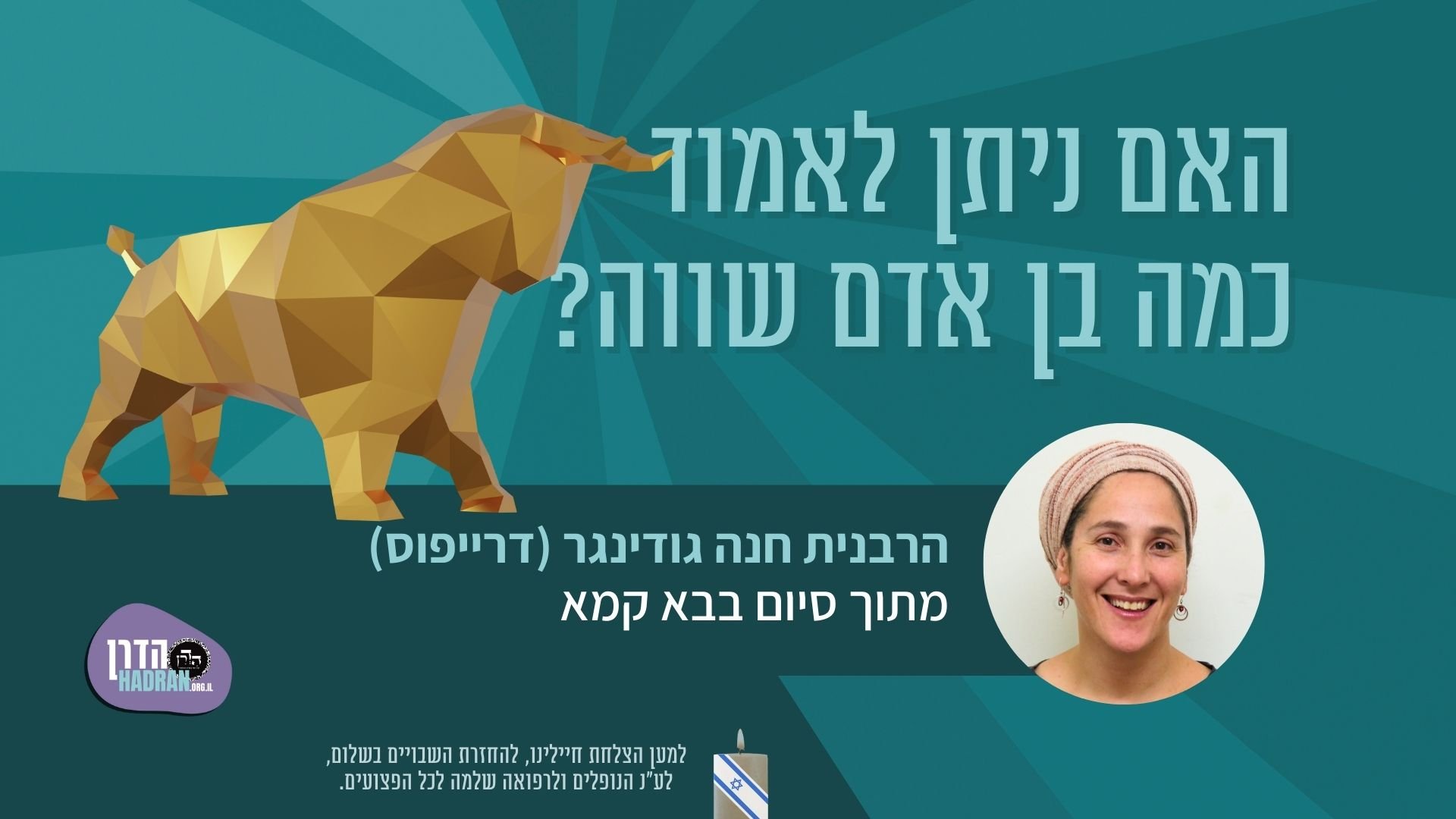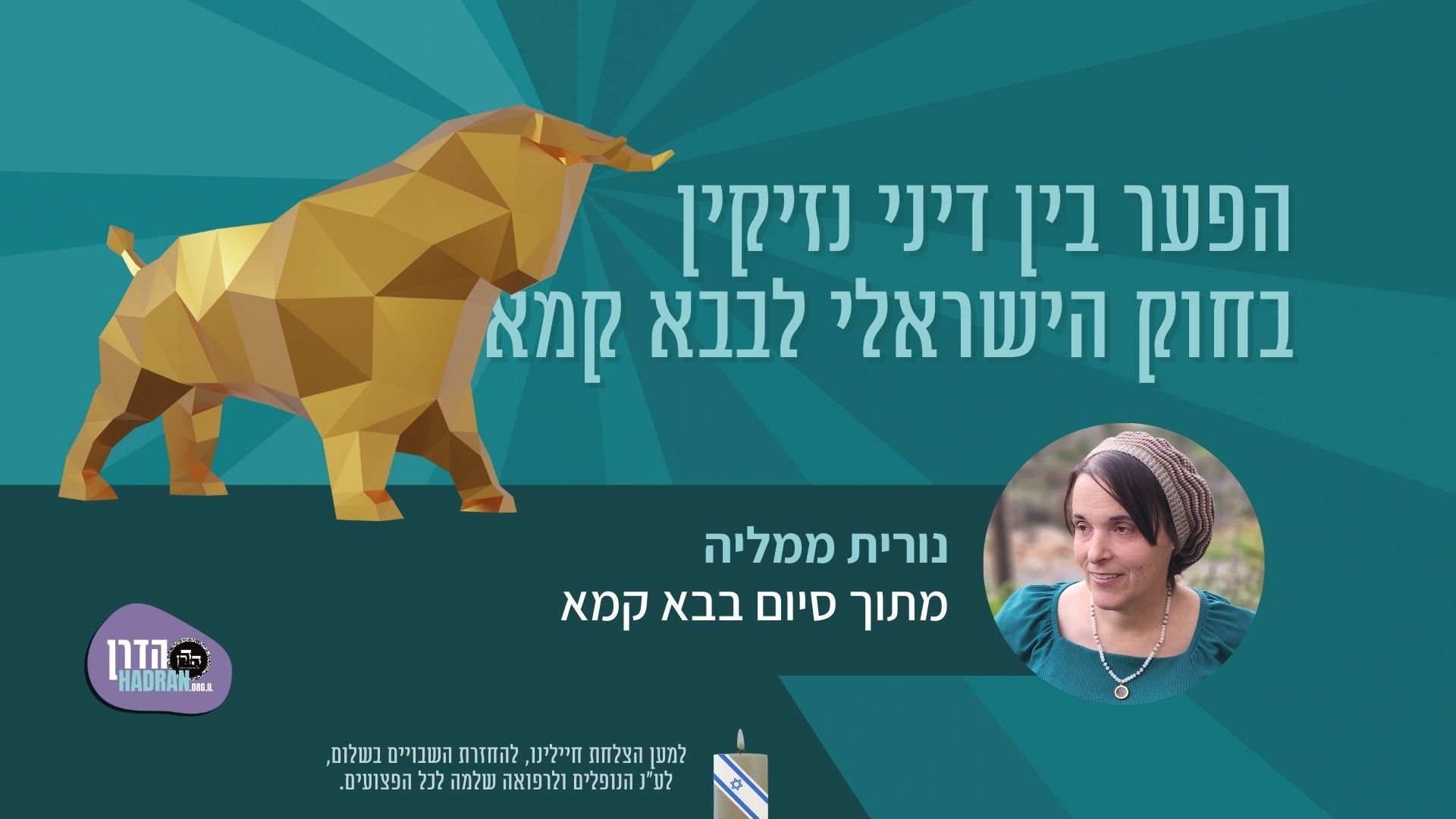ישנן ארבע דרכים שונות להבין את המשנה והאם היא סוברת כרבי טרפון לגבי נזקי קרן ברשות הניזק (נזק שלם)או כחכמים (חצי נזק)? נזק על ידי רביצת הבהמה נחשב לא טיפוסי (קרן). אבל האם זה רק לרביצה על פריטים גדולים או גם על קטנים? קיימות גרסאות שונות מה פסק רבי אלעזר בנושא והאם הובאה ברייתא להוכיח או להעלות קושי בדעתו. מהי ברדלס המוזכרת במשנה? שמואל הבדיל בין אריה שתפס אחר בטלפיו (דרס) ואכל אותו לבין אריה שתקף בעל חיים בשיניו (טרף) ואכל אותו. הראשון נחשב אופייני (פטור ברשות הרבים) והשני לא אופייני (חייב ברשות הרבים). האם זה באמת לא טיפוסי שאריה תוקף חיה אחרת ואוכל אותה? איך זה נפתר? במה שונה מבנה התשלום עבור שור תם ושור מועד?
הלימוד השבוע מוקדש לזכות ולשלום הַיְימׇנוֹט אֱמוּנָה בַּת באנצ’י (קָסָאוּ) בת 11 שנעלמה במקום מגוריה בצפת, לפני שנתיים, ביום ט”ז אדר תשפ”ד (25.2.24), ולא נודעו עקבותיה.
הלימוד השבוע מוקדש למען ביטחון המדינה, החיילים והאזרחים, ולמען חירותו של העם האיראני. שנזכה בקרוב שיתקיים בנו הפסוק: "לַיְּהוּדִים הָיְתָה אוֹרָה וְשִׂמְחָה וְשָׂשֹׂן וִיקָר”.
הלימוד השבוע מוקדש לזכות וְלִשְׁלוֹם הָיימָנוֹט אֱמוּנָה בַּת באנצ’י (קָסָאוּ), בת 11 שנעלמה במקום מגוריה בצפת, לפני שנתיים, ביום ט”ז אדר תשפ״ד (25.2.24), ולא נודעו עקבותיה. אנו מתפללים שֶׁתִּמָּצֵא וְתוּשַׁב לביתה במהרה!
רוצה להקדיש שיעור?

כלים
הלימוד השבוע מוקדש לזכות ולשלום הַיְימׇנוֹט אֱמוּנָה בַּת באנצ’י (קָסָאוּ) בת 11 שנעלמה במקום מגוריה בצפת, לפני שנתיים, ביום ט”ז אדר תשפ”ד (25.2.24), ולא נודעו עקבותיה.
הלימוד השבוע מוקדש למען ביטחון המדינה, החיילים והאזרחים, ולמען חירותו של העם האיראני. שנזכה בקרוב שיתקיים בנו הפסוק: "לַיְּהוּדִים הָיְתָה אוֹרָה וְשִׂמְחָה וְשָׂשֹׂן וִיקָר”.
הלימוד השבוע מוקדש לזכות וְלִשְׁלוֹם הָיימָנוֹט אֱמוּנָה בַּת באנצ’י (קָסָאוּ), בת 11 שנעלמה במקום מגוריה בצפת, לפני שנתיים, ביום ט”ז אדר תשפ״ד (25.2.24), ולא נודעו עקבותיה. אנו מתפללים שֶׁתִּמָּצֵא וְתוּשַׁב לביתה במהרה!
כלים
העמקה
רוצה להבין מה באמת קורה מתחת לפני השטח של הסוגיה?
שיעורים, פודקאסטים והרחבות של מיטב המורות שלנו יפתחו לך עוד זוויות וכיווני חשיבה.
חדשה בלימוד הגמרא?
זה הדף הראשון שלך? איזו התרגשות עצומה! יש לנו בדיוק את התכנים והכלים שיעזרו לך לעשות את הצעדים הראשונים ללמידה בקצב וברמה שלך, כך תוכלי להרגיש בנוח גם בתוך הסוגיות המורכבות ומאתגרות.
פסיפס הלומדות שלנו
גלי את קהילת הלומדות שלנו, מגוון נשים, רקעים וסיפורים. כולן חלק מתנועה ומסע מרגש ועוצמתי.
בבא קמא טז
כּוּלַּהּ רַבִּי טַרְפוֹן הִיא; רֵישָׁא – בְּחָצֵר הַמְיוּחֶדֶת לְפֵירוֹת לְאֶחָד מֵהֶן, וְלָזֶה וְלָזֶה לִשְׁוָרִים; דִּלְגַבֵּי שֵׁן הָוְיָא לַהּ חֲצַר הַנִּיזָּק. וּלְגַבֵּי קֶרֶן הָוְיָא רְשׁוּת הָרַבִּים.
The entire mishna is in accordance with the opinion of Rabbi Tarfon; the first part of the latter clause is stated with regard to a jointly owned courtyard, which under the terms of their partnership is designated for the use of one of them, i.e., the injured party, to keep his produce there, and for this one and for that one to keep their oxen there. Accordingly, with regard to damage of the category of Eating caused by one partner’s ox to the injured party’s produce in that courtyard, it is equivalent to the case of a courtyard owned exclusively by the injured party, and the ox’s owner is liable for all the damage. But with regard to damage of the category of Goring, since they are both allowed to keep oxen there, the courtyard is equivalent to a public domain, and if one’s innocuous ox causes damage there, one is liable for only half the cost of the damage.
אָמַר רַב כָּהֲנָא: אַמְרִיתַהּ לִשְׁמַעְתָּא קַמֵּיהּ דְּרַב זְבִיד מִנְּהַרְדְּעָא, וַאֲמַר לִי: מִי מָצֵית מוֹקְמַתְּ לַהּ כּוּלַּהּ כְּרַבִּי טַרְפוֹן?! הָקָתָנֵי: ״הַשֵּׁן מוּעֶדֶת לֶאֱכוֹל אֶת הָרָאוּי לָהּ״; רָאוּי לָהּ – אִין, שֶׁאֵין רָאוּי לָהּ – לָא;
Rav Kahana said: I stated this teaching of Rabbi Elazar before Rav Zevid of Neharde’a, and he said to me: Are you really able to interpret that the entire mishna is in accordance with the opinion of Rabbi Tarfon? But doesn’t the mishna teach: Concerning acts of damage performed with the tooth, the animal is considered forewarned with regard to eating that which is fitting for it to eat. This indicates that only if what it eats is fitting for it, then yes, one is liable for the full cost of the damage, but if it eats something that is not fitting for it, the owner would not be liable for the full cost of the damage, but only for half the cost of the damage.
וְאִי רַבִּי טַרְפוֹן, הָאָמַר: מְשׁוּנֶּה קֶרֶן בַּחֲצַר הַנִּיזָּק נֶזֶק שָׁלֵם מְשַׁלֵּם!
Rav Kahana explains his difficulty: And if the mishna is in accordance with the opinion of Rabbi Tarfon, the owner should be liable to pay the full cost of the damage even if his animal ate something not fitting for it, as doesn’t Rabbi Tarfon say: The halakha of cases of Goring performed by an innocuous animal, which is atypical, done in the courtyard of the injured party, is that the owner of the ox pays the full cost of the damage even if the ox is innocuous.
אֶלָּא לְעוֹלָם רַבָּנַן הִיא; וְחַסּוֹרֵי מְחַסְּרָא, וְהָכִי קָתָנֵי: חֲמִשָּׁה תַּמִּים הֵן, וְאִם הוּעֲדוּ – חֲמִשְׁתָּן מוּעָדִין.
Rather, Rav Kahana said: Actually it must be that the entire mishna is in accordance with the opinion of the Rabbis and the mishna is incomplete and this is what it is teaching: The opening clause should be understood as saying: There are five damage-causing acts that animals can perform twice and remain innocuous, but if they were warned for performing those acts three times, with regard to the five acts they are considered forewarned, i.e., the mishna is not referring to two different sets of damages, five acts for which the animal is considered innocuous and five for which it is considered forewarned. Rather, both statements in the initial clause of the mishna are referring to the same five acts of Goring, and they teach that although the animal is initially considered innocuous with regard to these five acts, it can become forewarned.
וְשֵׁן וָרֶגֶל מוּעָדִין מִתְּחִילָּתָן. וְהֵיכָן הֶעָדָתָן? בַּחֲצַר הַנִּיזָּק.
The next part of the mishna then provides another halakha: But for damage of the categories of Eating and Trampling, an animal is considered forewarned from the outset. The next two items in the mishna: A forewarned ox and an ox that causes damage on the property of the injured party, should be understood as a question and an answer: And where does their forewarned status with regard to these acts apply? It applies in the courtyard of the injured party. According to Rav Kahana’s explanation, the statement: In the courtyard of the injured party, refers only to cases of Eating or Trampling, not to acts classified as Goring, and therefore it is true even according to the opinion of the Rabbis.
מַתְקֵיף לַהּ רָבִינָא, הָא קָתָנֵי לְקַמַּן: ״שׁוֹר הַמַּזִּיק בִּרְשׁוּת הַנִּיזָּק כֵּיצַד״. אִי אָמְרַתְּ בִּשְׁלָמָא אַיְירִי בַּהּ, מִשּׁוּם הָכִי קָתָנֵי ״כֵּיצַד״. אֶלָּא אִי אָמְרַתְּ לָא אַיְירִי בַּהּ, מַאי ״כֵּיצַד״?
Ravina objects to this explanation: Doesn’t the mishna below (24b) teach: With regard to the case of an ox that causes damage to the property of the injured party on the property of the injured party, stated in the mishna here (15b), how so, i.e., what are the circumstances in which one is liable to pay the full cost of the damage? The mishna below (24b) proceeds to list acts of damage classified as Goring. Ravina states his objection: Granted, if you say that the mishna here (15b) discusses that case, i.e., that it is referring to Goring, it is due to that ruling that the mishna below teaches: How so, and proceeds to discuss one’s liability for Goring, as it is elucidating the case mentioned in the mishna here. But if you say, as Rav Zevid suggests, that the mishna here (15b) does not discuss Goring, what is the meaning of the mishna below when it asks: How so, and then proceeds to discuss one’s liability for Goring?
אֶלָּא אָמַר רָבִינָא: חַסּוֹרֵי מְחַסְּרָא, וְהָכִי קָתָנֵי: חֲמִשָּׁה תַּמִּים הֵן. וְאִם הוּעֲדוּ – חֲמִשְׁתָּן מוּעָדִין;
Rather, Ravina said: The mishna is incomplete and this is what it is teaching: There are five damage-causing acts that animals can perform twice and remain innocuous, but if they were warned for performing those acts three times with regard to the five acts, they are considered forewarned.
וְשֵׁן וָרֶגֶל – מוּעָדִין מִתְּחִילָּתָן; וְזֶהוּ שׁוֹר הַמּוּעָד. וְשׁוֹר הַמַּזִּיק בִּרְשׁוּת הַנִּיזָּק – מַחְלוֹקֶת רַבִּי טַרְפוֹן וְרַבָּנַן. וְיֵשׁ מוּעָדִים אֲחֵרִים כַּיּוֹצֵא בְּאֵלּוּ – הַזְּאֵב, וְהָאֲרִי, וְהַדּוֹב, וְהַבַּרְדְּלָס, וְהַנָּמֵר, וְהַנָּחָשׁ.
The next part of the mishna then provides another halakha: But for damage of the categories of Eating and Trampling, an animal is considered forewarned from the outset, and this is a case in which all agree that the animal is classified as a forewarned ox. And there is the case of an ox that causes damage to the property of the injured party, on the property of the injured party, which is subject to a dispute between Rabbi Tarfon and the Rabbis. And there are other cases similar to these in which animals are considered forewarned from the outset, namely: The wolf, the lion, the bear, the leopard, the bardelas, and the snake.
תַּנְיָא נָמֵי הָכִי: חֲמִשָּׁה תַּמִּים הֵן. וְאִם הוּעֲדוּ – חֲמִשְׁתָּן מוּעָדִין; וְשֵׁן וָרֶגֶל – מוּעָדִין מִתְּחִילָּתָן; וְזֶהוּ שׁוֹר הַמּוּעָד. וְשׁוֹר הַמַּזִּיק בִּרְשׁוּת הַנִּיזָּק – מַחְלוֹקֶת רַבִּי טַרְפוֹן וְרַבָּנַן. וְיֵשׁ מוּעָדִין אֲחֵרִים כַּיּוֹצֵא בְּאֵלּוּ – הַזְּאֵב, וְהָאֲרִי, הַדּוֹב, וְהַנָּמֵר, וְהַבַּרְדְּלָס, וְהַנָּחָשׁ.
The Gemara notes: This interpretation of the mishna is also taught in a baraita: There are five damage-causing acts that animals can perform twice and remain innocuous, but if they were warned for performing those acts three times with regard to the five acts, they are considered forewarned. The next part of the mishna then provides another halakha: But for damage of the categories of Eating and Trampling, an animal is considered forewarned from the outset, and this is a case in which all agree that the animal is classified as a forewarned ox. And there is the case of an ox that causes damage to the property of the injured party, on the property of the injured party, which is subject to a dispute between Rabbi Tarfon and the Rabbis. And there are other cases similar to these in which animals are considered forewarned from the outset, namely: The wolf, the lion, the bear, the leopard, the bardelas, and the snake.
אִיכָּא דְּרָמוּ לַהּ מִירְמָא – תְּנַן: חֲמִשָּׁה תַּמִּים וַחֲמִשָּׁה מוּעָדִים. וְתוּ לֵיכָּא?! וְהָאִיכָּא הַזְּאֵב, הָאֲרִי, וְהַדּוֹב, וְהַנָּמֵר, וְהַבַּרְדְּלָס, וְהַנָּחָשׁ!
There are those who raise this issue as a contradiction and through doing so arrived at the same conclusions, as follows: We learned in the opening clause of the mishna: There are five damage-causing acts that animals can perform twice and remain innocuous, and there are five damage-causing acts for which an animal is considered forewarned. With regard to this, one can ask: But is there nothing else? But aren’t there the cases mentioned in the continuation of the mishna: The wolf, the lion, the bear, the leopard, the bardelas, and the snake? These are considered to be forewarned even if they had never caused damage before.
וּמְשַׁנֵּי, אָמַר רָבִינָא: חַסּוֹרֵי מְחַסְּרָא, וְהָכִי קָתָנֵי: חֲמִשָּׁה תַּמִּים הֵן. וְאִם הוּעֲדוּ – חֲמִשְׁתָּן מוּעָדִין; וְשֵׁן וָרֶגֶל מוּעָדִין מִתְּחִילָּתָן; וְזֶהוּ שׁוֹר הַמּוּעָד. וְשׁוֹר הַמַּזִּיק בִּרְשׁוּת הַנִּיזָּק – מַחְלוֹקֶת רַבִּי טַרְפוֹן וְרַבָּנַן. וְיֵשׁ מוּעָדִין אֲחֵרִים כַּיּוֹצֵא בְּאֵלּוּ – הַזְּאֵב, וְהָאֲרִי, הַדּוֹב, וְהַנָּמֵר, וְהַבַּרְדְּלָס, וְהַנָּחָשׁ.
And they resolve the contradiction through that which Ravina said: The mishna is incomplete and this is what it is teaching: There are five damage-causing acts that animals can perform twice and remain innocuous, but if they were warned for performing those acts three times with regard to the five acts, they are considered forewarned. The next part of the mishna then provides another halakha: But for damage of the categories of Eating and Trampling, an animal is considered forewarned from the outset, and this is a case in which all agree that the animal is classified as a forewarned ox. And there is the case of an ox that causes damage to the property of the injured party, on the property of the injured party, which is subject to a dispute between Rabbi Tarfon and the Rabbis. And there are other cases similar to these in which animals are considered forewarned from the outset, namely: The wolf, the lion, the bear, the leopard, the bardelas, and the snake.
וְלֹא לִרְבּוֹץ. אָמַר רַבִּי אֶלְעָזָר: לֹא שָׁנוּ אֶלָּא פַּכִּין גְּדוֹלִים, אֲבָל פַּכִּין קְטַנִּים – אוֹרְחֵיהּ הוּא.
§ The mishna teaches: An animal is not considered forewarned with regard to Goring, i.e., not for goring with its horns, nor for pushing with its body, nor for biting, nor for crouching upon items in order to damage them. Rabbi Elazar says: They taught this only with regard to large vessels, as it is atypical for an animal to crouch upon them, and therefore the act is classified as a subcategory of Goring. But if the animal crouched upon small vessels, since that is its typical manner of behavior, it is classified as a subcategory of Trampling, for which the animal is considered forewarned from the outset.
לֵימָא מְסַיַּיע לֵיהּ: הַבְּהֵמָה מוּעֶדֶת לְהַלֵּךְ כְּדַרְכָּהּ, וּלְשַׁבֵּר וּלְמַעֵךְ אֶת הָאָדָם וְאֶת הַבְּהֵמָה וְאֶת הַכֵּלִים.
The Gemara suggests: Let us say that the following baraita supports the opinion of Rabbi Elazar: An animal is considered forewarned, from the outset, to walk in its typical manner and to break or crush a person, or an animal, or vessels. The baraita indicates that an animal’s typical manner is to crush vessels, presumably by crouching down upon them. This would seem to contradict the mishna that states that such behavior is atypical. It would appear the only resolution to this contradiction is if one accepts the distinction made by Rabbi Elazar that the mishna concerns large vessels and the baraita concerns small vessels.
דִּלְמָא מִן הַצַּד.
The Gemara rejects this: Perhaps the baraita concerns a case where the animal pushed against the utensils from the side and crushed them against a wall, but it does not concern a case where it crouched upon them.
אִיכָּא דְּאָמְרִי, אָמַר רַבִּי אֶלְעָזָר: לָא תֵּימָא פַּכִּין גְּדוֹלִים הוּא דְּלָאו אוֹרְחֵיהּ, אֲבָל פַּכִּין קְטַנִּים אוֹרְחֵיהּ הוּא; אֶלָּא אֲפִילּוּ פַּכִּין קְטַנִּים נָמֵי לָאו אוֹרְחֵיהּ הוּא.
There are those who say a different version of this discussion, as follows: Rabbi Elazar says: Do not say that the mishna’s ruling refers only to large vessels, as it is atypical for an animal to crouch upon them, but if the animal crouched upon small vessels, that is its typical manner and for that type of damage the animal is considered forewarned. Rather, the mishna refers even to small vessels, as it is atypical for an animal to crouch upon them.
מֵיתִיבִי: וּלְמַעֵךְ אֶת הָאָדָם וְאֶת הַבְּהֵמָה וְאֶת הַכֵּלִים!
The Gemara raises an objection from a baraita: An animal is considered forewarned, from the outset, to walk in its typical manner and to break or crush a person, or an animal, or vessels.
אָמַר רַבִּי אֶלְעָזָר: דִּלְמָא מִן הַצַּד.
Rabbi Elazar said: Perhaps the baraita concerns only a case where the animal pushed against the utensils from the side and crushed them against a wall.
אִיכָּא דְּרָמֵי לַהּ מִירְמָא – תְּנַן: וְלֹא לִרְבּוֹץ. וְהָתַנְיָא: וּלְמַעֵךְ אֶת הָאָדָם וְאֶת הַבְּהֵמָה וְאֶת הַכֵּלִים! אָמַר רַבִּי אֶלְעָזָר: לָא קַשְׁיָא; כָּאן בְּפַכִּין גְּדוֹלִים, כָּאן בְּפַכִּין קְטַנִּים.
There are those who raise this issue as a contradiction: We learned in the mishna: An animal is not considered forewarned with regard to Goring, i.e., not for goring with its horns, nor for pushing with its body, nor for biting, nor for crouching upon items in order to damage them. But isn’t it taught in a baraita: An animal is considered forewarned, from the outset, to walk in its typical manner and to break or crush a person, or an animal, or vessels? In order to resolve this contradiction, Rabbi Elazar said: It is not difficult; here, in the mishna, the reference is to large vessels, while there, in the baraita, the reference is to small vessels.
הַזְּאֵב וְהָאֲרִי וְכוּ׳. מַאי בַּרְדְּלָס? אָמַר רַב יְהוּדָה: נַפְרְזָא. מַאי נַפְרְזָא? אָמַר רַב יוֹסֵף: אַפָּא.
§ The mishna teaches: The wolf, the lion, the bear, the leopard, the bardelas, and the snake; these are considered to be forewarned even if they had never caused damage before. The Gemara asks: What is a bardelas? Rav Yehuda said: It is a nafreza. The Gemara asks: What is a nafreza? Rav Yosef said: It is an appa.
מֵיתִיבִי, רַבִּי מֵאִיר אוֹמֵר: אַף הַצָּבוֹעַ. רַבִּי אֶלְעָזָר אוֹמֵר: אַף הַנָּחָשׁ. וְאָמַר רַב יוֹסֵף: צָבוֹעַ זוֹ אַפָּא!
The Gemara raises an objection from a baraita: In addition to the list of animals that are considered forewarned, Rabbi Meir says: Also the hyena [tzavo’a]. Rabbi Elazar says: Also the snake. And Rav Yosef said in explanation of the baraita: The hyena mentioned by Rabbi Meir, this is the animal called an appa. If Rav Yosef understands a hyena to be an appa, how could he also claim, above, that it is a bardelas?
לָא קַשְׁיָא, כָּאן בְּצָבוֹעַ זָכָר, כָּאן בְּצָבוֹעַ נְקִיבָה.
The Gemara explains: It is not difficult: Here, in the baraita, Rabbi Meir is referring to a male hyena, and there, in the mishna, the reference is to a female hyena.
דְּתַנְיָא: צָבוֹעַ זָכָר לְאַחַר שֶׁבַע שָׁנִים נַעֲשֶׂה עֲטַלֵּף, עֲטַלֵּף לְאַחַר שֶׁבַע שָׁנִים נַעֲשֶׂה עַרְפָּד, עַרְפָּד לְאַחַר שֶׁבַע שָׁנִים נַעֲשֶׂה קִימּוֹשׂ, קִימּוֹשׂ לְאַחַר שֶׁבַע שָׁנִים נַעֲשֶׂה חוֹחַ, חוֹחַ לְאַחַר שֶׁבַע שָׁנִים נַעֲשֶׂה שֵׁד. שִׁדְרוֹ שֶׁל אָדָם – לְאַחַר שֶׁבַע שָׁנִים נַעֲשֶׂה נָחָשׁ. וְהָנֵי מִילֵּי דְּלָא כָּרַע בְּ״מוֹדִים״.
And it is apparent that a male hyena is distinct from a female one, as it is taught in a baraita: A male hyena after seven years metamorphoses into an insectivorous bat [atalef ]; an insectivorous bat after seven years metamorphoses into a herbivorous bat [arpad]; a herbivorous bat after seven years metamorphoses into a thistle [kimosh]; a thistle after seven years metamorphoses into a briar [ḥo’aḥ]; and a briar after seven years metamorphoses into a demon. Similarly, a person’s spine, seven years after his death, metamorphoses into a snake. The Gemara qualifies the last statement: And this matter applies only to a case where that person did not bow during the blessing of thanksgiving, the eighteenth blessing of the Amida prayer.
אָמַר מָר, רַבִּי מֵאִיר אוֹמֵר: אַף הַצָּבוֹעַ.
The Gemara analyzes the baraita: The Master says above: In addition to the list of animals that are considered forewarned, Rabbi Meir says: Also the hyena.
רַבִּי אֶלְעָזָר אוֹמֵר: אַף הַנָּחָשׁ. וְהָא אֲנַן תְּנַן, רַבִּי אֶלְעָזָר אוֹמֵר: בִּזְמַן שֶׁהֵן בְּנֵי תַרְבּוּת – אֵינָן מוּעָדִים; וְהַנָּחָשׁ מוּעָד לְעוֹלָם!
Rabbi Elazar says: Also the snake. By using the term also, Rabbi Elazar suggests he considers a snake to be forewarned to the same extent as the other animals in the mishna’s list, which, according to his opinion, are not considered to be forewarned if they are domesticated. The Gemara asks: But didn’t we learn in the mishna: Rabbi Elazar says: When these animals are domesticated they are not considered to be forewarned, but the snake is always considered forewarned?
תְּנִי: נָחָשׁ.
The Gemara answers: Emend and teach the baraita as saying that Rabbi Elazar says: A snake, instead of saying: Also a snake. Accordingly, the baraita is teaching that he holds that only a snake is considered to be forewarned under all circumstances because he holds that even if it is domesticated it is still prone to cause damage.
אָמַר שְׁמוּאֵל: אֲרִי בִּרְשׁוּת הָרַבִּים; דָּרַס וְאָכַל – פָּטוּר. טָרַף וְאָכַל – חַיָּיב.
§ The Gemara considers cases of damage caused by a lion: Shmuel says: With regard to a lion that kills an animal in the public domain, if it clawed its prey and ate it, the lion’s owner is exempt from liability. But if it first tore apart its prey with its teeth in order to kill it, and only then ate it, the owner is liable for the damage.
דָּרַס וְאָכַל פָּטוּר – כֵּיוָן דְּאוֹרְחֵיהּ לְמִידְרַס, הָוֵה לֵיהּ כְּמוֹ שֶׁאָכְלָה פֵּירוֹת וִירָקוֹת, דְּהָוֵי לֵיהּ שֵׁן בִּרְשׁוּת הָרַבִּים, וּפָטוּר. טָרַף – לָאו אוֹרְחֵיהּ הוּא.
The Gemara elucidates: If it clawed its prey and ate it, the owner is exempt, since it is its typical manner to claw its prey and eat it, and it is therefore equivalent to the case of an animal that eats fruit and vegetables belonging to someone else. Therefore, it is classified as Eating done in a public domain, and the owner of the lion is exempt. But if the lion first tore apart its prey to kill it, since this is not its typical manner, the act is classified as Goring, for which an owner is liable even in a public thoroughfare.
לְמֵימְרָא דִּטְרֵיפָה לָאו אוֹרְחֵיהּ הוּא? וְהָכְתִיב ״אַרְיֵה טֹרֵף בְּדֵי גֹרוֹתָיו״! בִּשְׁבִיל גּוֹרוֹתָיו. ״וּמְחַנֵּק לְלִבְאֹתָיו״! בִּשְׁבִיל לִבְאוֹתָיו. ״וַיְמַלֵּא טֶרֶף חֹרָיו״! בִּשְׁבִיל חוֹרָיו. ״וּמְעֹנֹתָיו טְרֵפָה״! בִּשְׁבִיל מְעוֹנוֹתָיו.
The Gemara asks: Is this to say that tearing apart its prey is not the typical manner of a lion? But isn’t it written: “The lion tears apart for its young, and it strangles for its lionesses, and it fills its caves with prey, and its den with that which was torn apart” (Nahum 2:13). The description in the verse clearly indicates that it is the typical manner of a lion to tear apart its prey. The Gemara answers that each phrase of this verse is referring not to a situation where the lion catches prey for its own immediate use, but to one where it provides food for its young, as it says: “The lion tears apart for its young”; to provide food for its lionesses: “And it strangles for its lionesses”; to provide food for the young cubs in its lair: “And it filled its lair with prey”; and to provide food for the young cubs in its den: “And its den with that which was torn apart.” Therefore, we cannot learn from this verse that it is the typical manner of a lion to tear apart prey for its own immediate use.
וְהָתַנְיָא: וְכֵן חַיָּה שֶׁנִּכְנְסָה לַחֲצַר הַנִּיזָּק, טָרְפָה בְּהֵמָה וְאָכְלָה בָּשָׂר – מְשַׁלֵּם נֶזֶק שָׁלֵם!
The Gemara asks: But isn’t it taught in a baraita concerning acts classified as Eating: And similarly, in the case of a wild animal, including a lion, that entered the courtyard of the injured party and tore apart the courtyard owner’s animal and ate its meat, the owner of the wild animal pays the full cost of the damage.
הָכָא בְּמַאי עָסְקִינַן – שֶׁטָּרְפָה לְהַנִּיחַ. הָא ״אָכְלָה״ קָתָנֵי! בְּשֶׁנִּמְלְכָה וְאָכְלָה.
The Gemara answers: With what are we dealing here? This is a case where it tore apart the animal in order to leave it for later consumption. Since this is typical behavior for a lion, the lion is considered forewarned with regard to it. The Gemara asks: Doesn’t the baraita teach: And ate its meat? The Gemara answers: This is a case where the lion initially killed the animal to leave it for later consumption but then reconsidered and ate it.
מְנָא יָדְעִינַן? וְעוֹד, דִּשְׁמוּאֵל נָמֵי – דִּלְמָא הָכִי הוּא?
The Gemara questions this understanding: How can we know what the animal’s initial intentions were? And furthermore, if one accepts this claim, then the ruling of Shmuel is also called into question, as perhaps the case he ruled on is a case like this, where the lion initially intended to leave the prey he killed for later consumption, and therefore the owner should be exempt. The Gemara therefore rejects this understanding.
אָמַר רַב נַחְמָן בַּר יִצְחָק, לִצְדָדִין קָתָנֵי: שֶׁטָּרְפָה לְהַנִּיחַ, אוֹ דָרְסָה וְאָכְלָה – מְשַׁלֶּמֶת נֶזֶק שָׁלֵם.
Rav Naḥman bar Yitzḥak said: The baraita teaches two cases disjunctively and should be understood as teaching two halakhot: With regard to a lion that tore apart an animal in order to leave it for later consumption, or a lion that clawed its prey and ate it, since each acted in the typical manner of a lion, the owner pays the full cost of the damage.
רָבִינָא אָמַר: כִּי קָאָמַר שְׁמוּאֵל – בַּאֲרִי תַּרְבּוּת, וְאַלִּיבָּא דְּרַבִּי אֶלְעָזָר – דְּאָמַר: לָאו אוֹרְחֵיהּ.
Ravina said: It is the typical manner of a wild lion to kill its prey and then eat it, and therefore such damage is classified as Eating. Accordingly, if the damage was done in the public domain, the lion’s owner is exempt from any liability. When Shmuel says that an owner is liable if his lion does so, that was with regard to a domesticated lion and in accordance with the opinion of Rabbi Elazar, who says it is not the typical manner of a domesticated wild animal to attack. Accordingly, the act is classified as being of the category of Goring, for which one is liable even in a public thoroughfare.
אִי הָכִי, אֲפִילּוּ דָּרְסָה נָמֵי לִיחַיַּיב!
The Gemara asks: If so, then even when the lion clawed its prey and ate it, the owner should be liable for any damage it causes in a public domain, since according to Rabbi Elazar such behavior is atypical for a domesticated lion. Why then does Shmuel rule that in such a case the owner is exempt?
אֶלָּא דְּרָבִינָא לָאו אַשְּׁמוּאֵל אִתְּמַר, אֶלָּא אַמַּתְנִיתָא; כִּי תָּנֵי מַתְנִיתָא – בַּאֲרִי תַּרְבּוּת, וְאַלִּיבָּא דְּרַבִּי אֶלְעָזָר דְּאָמַר: לָאו אוֹרְחֵיהּ.
The Gemara concedes that its presentation of Ravina’s opinion is untenable: Rather, Ravina’s explanation was not stated in reference to Shmuel’s ruling, but rather in reference to the baraita, cited above, that discusses a case where a lion causes damage in the courtyard of the injured party. Accordingly, Ravina’s statement should be understood as follows: When the baraita teaches that one is liable if one’s lion tore apart an animal and ate it, that was with regard to a domesticated lion and in accordance with the opinion of Rabbi Elazar, who says it is not the typical manner of a domesticated wild animal to attack.
אִי הָכִי, חֲצִי נֶזֶק בָּעֵי לְשַׁלּוֹמֵי! דְּאִיַּיעַד.
The Gemara asks: If that is so, since the act is atypical behavior for a lion, it should be classified as Goring, and the owner should be required to pay for only half the cost of the damage. The Gemara answers: The baraita is referring to a case where the lion was forewarned.
אִי הָכִי, מַאי הַאי דְּקָתָנֵי לַהּ גַּבֵּי תּוֹלָדָה דְשֵׁן? גַּבֵּי תּוֹלָדָה דְקֶרֶן בָּעֵי לְמִיתְנְיַיהּ! קַשְׁיָא.
The Gemara questions further: If that is so, what is the reason that the baraita teaches this among the subcategories of Eating? It should have taught it among the subcategories of Goring. The Gemara concedes: This is a difficulty with this explanation.
מַתְנִי׳ מָה בֵּין תָּם לְמוּעָד?
MISHNA: What is the difference between the liability incurred for damage caused by an ox that is considered innocuous and the liability incurred for damage caused by an ox that is forewarned?
אֶלָּא שֶׁהַתָּם מְשַׁלֵּם חֲצִי נֶזֶק מִגּוּפוֹ, וּמוּעָד מְשַׁלֵּם נֶזֶק שָׁלֵם מִן הָעֲלִיָּיה.
The only differences are that for damage caused by an innocuous ox, the owner pays half the cost of the damage exclusively from proceeds of the sale of the body of the ox, and for a forewarned ox he pays the full cost of the damage from his higher property.
גְּמָ׳ מַאי ״עֲלִיָּיה״? אָמַר רַבִּי אֶלְעָזָר: בִּמְעוּלֶּה שֶׁבִּנְכָסָיו.
GEMARA: What does the mishna mean by saying he pays from his higher [aliyya] property? Rabbi Elazar says: It means that he pays with the superior-quality [bame’ulla] items of his property.
וְכֵן הוּא אוֹמֵר: ״וַיִּשְׁכַּב חִזְקִיָּהוּ עִם אֲבֹתָיו, וַיִּקְבְּרֻהוּ בְּמַעֲלֵה קִבְרֵי בְנֵי דָוִיד״, וְאָמַר רַבִּי אֶלְעָזָר: ״בְּמַעֲלֵה״ – אֵצֶל מְעוּלִּים שֶׁבַּמִּשְׁפָּחָה, וּמַאן נִינְהוּ – דָּוִד וּשְׁלֹמֹה.
And similarly, the fact that the word aliyya is referring to superior-quality property is indicated by the verse that states: “And Hezekiah lay with his ancestors, and they buried him in the best [bema’ale] of the sepulchers of the descendants of David” (II Chronicles 32:33), and Rabbi Elazar says: The term bema’ale means beside the best of the family. And who are they? David and Solomon.
״וַיִּקְבְּרֻהוּ בְקִבְרֹתָיו אֲשֶׁר כָּרָה לוֹ בְּעִיר דָּוִיד, וַיַּשְׁכִּיבֻהוּ בַּמִּשְׁכָּב אֲשֶׁר מִלֵּא בְּשָׂמִים וּזְנִים״ – מַאי ״בְּשָׂמִים וּזְנִים״? רַבִּי אֶלְעָזָר אָמַר: זְינֵי זְינֵי. רַבִּי שְׁמוּאֵל בַּר נַחְמָנִי אָמַר: בְּשָׂמִים שֶׁכׇּל הַמֵּרִיחַ בָּהֶן בָּא לִידֵי זִימָּה.
The Gemara offers an interpretation of another verse about the burial of a king of Judea, King Asa: “And they buried him in his own sepulchers, which he had hewn out for himself in the city of David, and laid him in the resting place, which was filled with perfumes and spices [zenim] prepared by the perfumers’ art” (II Chronicles 16:14). What is meant by “perfumes and spices”? Rabbi Elazar says: It means many different types [zinei] of perfumes. Rabbi Shmuel bar Naḥmani says: The word zenim sounds similar to the word zenut, licentiousness, and should therefore be understood about types of perfumes that anyone who smells them is led to licentiousness.
״כִּי כָרוּ שׁוּחָה לְלׇכְדֵנִי, וּפַחִים טָמְנוּ לְרַגְלָי״ – רַבִּי אֶלְעָזָר אָמַר: שֶׁחֲשָׁדוּהוּ מִזּוֹנָה. רַבִּי שְׁמוּאֵל בַּר נַחְמָנִי אָמַר: שֶׁחֲשָׁדוּהוּ מֵאֵשֶׁת אִישׁ.
The Gemara cites another dispute between Rabbi Elazar and Rabbi Shmuel bar Naḥmani: Jeremiah requested of God to punish those who hounded him: “For they have dug a pit to trap me and they have set snares for my feet” (Jeremiah 18:22). In what way did they dig a pit to trap him? Rabbi Elazar says: They cast suspicion upon him of engaging in intercourse with a woman who had engaged in sexual intercourse with a man forbidden to her by the Torah [zona]. Rabbi Shmuel bar Naḥmani says: They cast suspicion upon him of engaging in intercourse with a married woman.
בִּשְׁלָמָא לְמַאן דְּאָמַר שֶׁחֲשָׁדוּהוּ מִזּוֹנָה – הַיְינוּ דִּכְתִיב: ״כִּי שׁוּחָה עֲמֻקָּה זוֹנָה״. אֶלָּא לְמַאן דְּאָמַר שֶׁחֲשָׁדוּהוּ מֵאֵשֶׁת אִישׁ, מַאי ״שׁוּחָה״? אַטּוּ אֵשֶׁת אִישׁ מִי נָפְקָא מִכְּלַל זוֹנָה?
The Gemara asks: Granted, according to the one who says that they cast suspicion upon him of engaging in intercourse with a zona, this is because the word “pit” is used as a metaphor for a zona, as it is written: “For a zona is a deep pit” (Proverbs 23:27). But according to the one who says that they cast suspicion upon him of engaging in intercourse with a married woman, for what reason did Jeremiah use the word “pit”? The Gemara answers: Due to the fact that she is a married woman, should she be excluded from the category of a zona? If she commits adultery she is also termed a zona, and the term “pit” can justifiably be applied to her.
בִּשְׁלָמָא לְמַאן דְּאָמַר שֶׁחֲשָׁדוּהוּ מֵאֵשֶׁת אִישׁ – הַיְינוּ דִּכְתִיב: ״וְאַתָּה ה׳ יָדַעְתָּ אֶת כׇּל עֲצָתָם עָלַי לַמָּוֶת״. אֶלָּא לְמַאן דְּאָמַר שֶׁחֲשָׁדוּהוּ מִזּוֹנָה, מַאי ״לַמָּוֶת״? שֶׁהִשְׁלִיכוּהוּ לִבְאֵר טִיט.
The Gemara asks: Granted, according to the one who says that they cast suspicion upon him of engaging in intercourse with a married woman, this is consistent with that which is written: “You, Lord, know all their plans to kill me” (Jeremiah 18:23). By claiming he engaged in intercourse with a married woman, they implicated him in a prohibition punishable by the death penalty. But according to the one who says that they suspected him of engaging in intercourse with a zona, what did he mean by saying “to kill me” when there is no court-imposed capital punishment for doing so? The Gemara answers: Jeremiah was referring to the fact that they cast him into a pit of mire.
דָּרֵשׁ רָבָא, מַאי דִּכְתִיב: ״יִהְיוּ מֻכְשָׁלִים לְפָנֶיךָ, בְּעֵת אַפְּךָ עֲשֵׂה בָּהֶם״? אָמַר יִרְמְיָה לִפְנֵי הַקָּדוֹשׁ בָּרוּךְ הוּא: רִבּוֹנוֹ שֶׁל עוֹלָם, אֲפִילּוּ בְּשָׁעָה שֶׁעוֹשִׂין צְדָקָה – הַכְשִׁילֵם בִּבְנֵי אָדָם שֶׁאֵינָן מְהוּגָּנִים, כְּדֵי שֶׁלֹּא יְקַבְּלוּ עֲלֵיהֶן שָׂכָר.
Rava interpreted a verse homiletically: What is the meaning of that which is written: “Let them be made to stumble before You; deal with them in the time of Your anger” (Jeremiah 18:23)? It means that Jeremiah said before the Holy One, Blessed be He: Master of the Universe, even at a time when they try to perform acts of charity, make them stumble by ensuring that they do so with people who are unworthy of charity in order that they should not receive the reward for helping them.
״וְכָבוֹד עָשׂוּ לוֹ בְמוֹתוֹ״ – מְלַמֵּד שֶׁהוֹשִׁיבוּ יְשִׁיבָה עַל קִבְרוֹ.
The Gemara, above, cited a verse concerning King Hezekiah’s burial. The Gemara cites the continuation of that verse: “And they afforded him honor in his death” (II Chronicles 32:33). This teaches that they established a yeshiva at his grave to study Torah there.
פְּלִיגִי בַּהּ רַבִּי נָתָן וְרַבָּנַן, חַד אָמַר שְׁלֹשָׁה,
Rabbi Natan and the Rabbis disagree with regard to this yeshiva: One said: They studied there for three days.

































